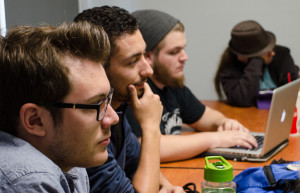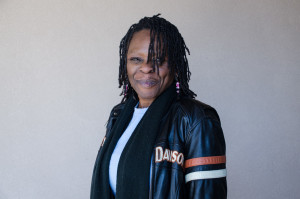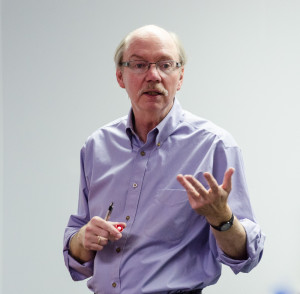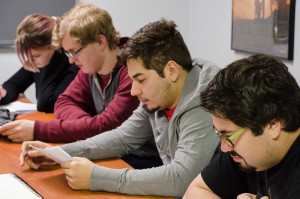Tags
Related Posts
Share This
Writing for TV Class

Seniors Riley Gardern and DeAndre Montoya listen to Terry Borst for advice on screenplay editing.
Photo by Rebeca Gonzalez
With real world experience being such an important part of an undergraduate degree, one class at SFUAD is teaching students extremely valuable tools when it comes to writing television. Students in Film professor Terry Borst’s class are focusing on writing “spec scripts,” a major skill needed for anyone wanting to break into the world of television.
“First of all, ‘spec’ means that you’re writing for speculation. So basically, you’re always writing on spec any time you’re not getting paid for a project. Anybody who’s pursuing [screen]writing, sooner or later will be writing on ‘spec,’ although it’s always great to get paid. Specifically here, what students are doing is writing specs for existing shows and the idea is that spec episode will serve as a calling card for their talents—probably not for the show that they’ve written for—but for other shows that are least in the same genre,” Borst explains. Students in his class have the opportunity to choose a show they enjoy and write a spec script in hopes of using it to demonstrate to another show that they can take on someone else’s voice, an important skill when it comes to television writing.
Students in the class have chosen a variety of shows to work on. While there has been some overlap with three students deciding to write the animated Adult Swim show “Rick and Morty” and two deciding to write the USA drama “Mr. Robot,” the diversity of shows provides great variety for students to discuss. From Comedy Central’s “Broad City” to Netflix’s “Jessica Jones,” there is a large mix of comedy and drama. Film senior Phil Hudson decided to write “Mr. Robot” because of the show’s accolades. “I wanted a show that was popular in the industry and “Mr. Robot” was nominated for the Golden Globes and talked about the way “Game of Thrones” was a few years ago. I also wanted something challenging. This show is not a typical cut-and-dry procedural. It is paradigm breaking in the way it uses voiceover, psychological tension and structure,” Hudson says.

Bisi Ademulegun has been writing a script for “The Unbreakable Kimmy Schmidt.”
Photo by Rebeca Gonzalez
On the opposite spectrum of genre, Creative Writing and Literature senior Bisi Ademulegun is writing a spec for the Netflix comedy “The Unbreakable Kimmy Schmidt.” “I’d never seen [the show] before. I watched it. I felt that it was simple to follow. The characters were well defined,” Ademulegun explains. She goes on to say that her fellow students have helped her a lot with getting into some of the tougher-to-write characters. “I had trouble in the beginning with [writing] Kimmy Schmidt herself. It was easier for Titus, Lilian and Mrs. Voorhees because they’re very strong, comedic, well defined [and] vibrant, but Kimmy is just this naive character and the jokes are played off of her naivety and I never thought about that. It was mentioned in the class and I thought ‘Oh my god, that’s completely right.’ I’ve gotten to know her better as a character.”
One thing that has been invaluable to the students taking Writing for Television is the “writers’ rooms” that Borst has frequently split students up into depending on the genre in which they are writing. The rooms include comedy rooms, drama rooms and a specific “Rick and Morty” room due to the volume of students writing scripts of the show. These rooms mimic what actual writing rooms are like in the television industry.
Professional television writers on a show work for hours at a time, talking episodes over and “breaking” each story. In class, the students have the opportunity to practice doing the same thing on a smaller scale. “It felt…as if we were out in the real world. It was freaking awesome just to sit there and have my peers go over [my work]. ‘Here is my work,’ I’d say to the guys and the guys would just come back with ‘Oh, no. That isn’t going to work. This is going to work. Let’s try this. Let’s try that,’ and it was the same for them. I’d be listening to their work and helping them out,” Ademulegun said. “I’ve always admired “Modern Family.” How do they come up with all those jokes? How does one person—because that’s what I assumed—sit there and just do that? How does it work? The writers’ room showed me how it works and it works.”
While students only meet for an hour or two each class, they have been able to get a real world taste for how beneficial being in a writers’ room is. “I think the writers’ rooms are really important,” says Creative Writing and Literature senior Marina Woollven. “It’s kind of fundamental towards television writing itself. That kind of tight knit collaboration isn’t something that’s easily accomplished in other workshop classes, so I really enjoy that about the class.”

Terry Borst lectures on the importance of collaboration in screenplay writing.
Photo by Rebeca Gonzalez
Because students are working with existing material, there are challenges that arise that wouldn’t in any other workshop class. “The most challenging aspects of an unsolicited spec are getting the tone right and being a ‘controlled creative.’ Your episode must match the tone and character of the show so you prove you can adequately write others’ material,” Film senior Cosmo Ray says. He is writing a “Rick and Morty” spec script and finds that the hardest part of writing spec script is that he has to “make sure [to] come up with new ideas, but not so new that they alter the show (killing off characters, reusing old plots, things like that). If your episode can be shot in the midst of a season and not change the finale, you’re on the right track.” Students have to look very closely at the show they are specing, which is why Borst spends a lot of time having students break down episodes of their show both at the beginning of the class and periodically as the class goes forward.
Even students not working on a particular show have an understanding for their peers’ work. “What’s been terrific is that we’re able to as a class discuss a particular show and by this point, we know are all familiar with everybody else’s show. It’s really nice as opposed to any other workshop class where ‘Are you going to remember student X’s project from three weeks ago?’…I think in some ways what’s nice about [Writing for Television] is you have this level of investment, so even if you’re not working on a sitcom or this particular dramatic show, you still know the show. It’s been interesting for this particular class how often there’s commonality with just the love of particular shows. I think that’s great because it just makes everybody more invested in everybody’s individual project and that’s always the challenge in workshop,” Borst says.
Students echo this idea of investment. In class workshops, there is a huge feeling of camaraderie, which is similar to that of real writers’ rooms. “I’ve learned so much from listening to my peers…They don’t just say something because ‘hey, I need to have something to say’ or they’re trying to get one up on you. They really care about your work. They really want you to succeed. I love that about this class. It’s my favorite class,” Ademulegun says.

Students look over Marina Woollvey’s screenplay for an in class reading.
Photo by Rebeca Gonzalez
Another exciting facet of the class is the special guests that Borst brings in to speak. On March 22, “Star Trek: The Next Generation” writer Melinda Snodgrass visited the class. Students were able to ask her questions about her experience writing for television as well as receive advice for their own spec scripts. One thing that is unique about Snodgrass is that she wrote a spec for Star Trek: The Next Generation originally as just a sample, but it was then bought by the show, something that is unheard of in the industry. Her episode “The Measure of a Man” is a popular fan favorite. “Melinda was a great guest. She told it like it was and wasn’t shy about it. The most meaningful thing she said was to be true to yourself and the story. If people fight you, fight back,” says Ray. While Snodgrass was Borst’s first guest for the class, he has more lined up soon.
Writing for Television is a required class for students in the Story Development program in the Film School. While Borst couldn’t confirm when the class will be offered again, it will continued to be offered for students interested in writing episodic scripts. For more information on taking the class, students should contact their academic advisor.
The author of this article is a student in the Writing for Television class.






 Jackalope Magazine is the student magazine of Santa Fe University of Art and Design. Building on the interdisciplinary nature of our education, we aim to showcase the talent of our university and character of our city.
Jackalope Magazine is the student magazine of Santa Fe University of Art and Design. Building on the interdisciplinary nature of our education, we aim to showcase the talent of our university and character of our city.
Recent Comments